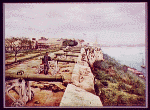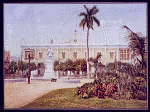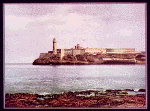Today in History: April 25
U.S. Declares War on Spain
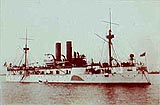
U.S. Battleship Maine,
Samuel H. Gottscho, photographer, before February 15, 1898.
Architecture and Interior Design for 20th Century America, 1935-1955
On April 25,1898, the United States formally declared war against Spain. The Monroe Doctrine, which since 1823 had viewed any European intervention in the Americas as a threat to U.S. security, coupled with the sinking of the U.S.S. Maine in Havana harbor precipitated U.S. engagement. Coverage by both the Hearst newspapers and the nascent film industry solidified public support for involvement in Cuba's struggle for independence.
Within months Spain's overseas empire, which had begun with Columbus' voyages of discovery and been long in the unraveling, finally collapsed under the U.S.'s two-pronged war strategy. Commodore George Dewey sailed to the Pacific the day war was declared and on May 1st defeated the Spanish fleet in the Philippines. In Cuba and Puerto Rico, the U.S. Marines and other troops, including Teddy Roosevelt and the Rough Riders, helped defeat Spanish forces in the Americas.
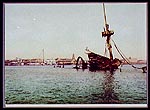
Restos del U.S.S. Maine,
William Henry Jackson, photographer, ca. 1900.
Touring Turn-of-the-Century America, 1880-1920
The U.S. and Spain signed a peace treaty in December of 1898. Spain gave up its claims to Puerto Rico, Cuba, and Guam and, for 20 million dollars, transferred the Philippines to the U.S. By contrast, the U.S. emerged from the war as a more significant player on the world stage.
- The Spanish-American War was the first U.S. war in which the motion picture camera played a role. See films made by the Edison Manufacturing Company and the American Mutoscope & Biograph Company in The Spanish-American War in Motion Pictures. Two special presentations are also available: The Motion Picture Camera Goes to War: The Spanish-American War and the Philippine Revolution and The World of 1898: The Spanish-American War.
- Search across the American Memory collections of photographs and prints on Cuba or Havana to find over 300 still images related to Cuba and the Spanish-American War.
- Search the Today in History Archive on the term Spanish-American War to learn more about events in the war including the mysterious destruction of the U.S.S. Maine.
- Also, search on Spanish-American War in American Life Histories, 1936-1940 to find recollections by veterans of that war. Or, search on the term Cuban War to hear a tune by that name in Voices from the Dust Bowl, 1940-1941.
- See the online exhibition 1492: An Ongoing Voyage to learn about the origins of Spanish expansion into the Americas and examine the first sustained contacts between American people and European explorers, conquerors and settlers.
Havana, Cuba, William Henry Jackson, photographer, copyright 1900.
Touring Turn-of-the-Century America, 1880-1920
Ella Fitzgerald
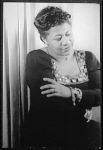
Portrait of Ella Fitzgerald,
Carl Van Vechten, photographer, January 19, 1940.
Creative Americans: Portraits by Van Vechten, 1932-1964
Ella Fitzgerald was born on April 25, 1918, in Newport News, Virginia. She was one of the leading jazz singers of all time.
Fitzgerald's career began at Amateur Night at Harlem's Apollo Theater. She soon went on to sing with the Chick Webb orchestra and made her first recordings in 1935. After Webb's death in 1939, she led the band for about three years before launching out on her own.
From the mid-1950s to the mid-1960s her career was managed by jazz impresario Norman Granz. During this time Fitzgerald recorded a series of 19 albums and her inimitable style became nationally recognized. Granz also arranged for her to tour extensively and to work closely with the Oscar Peterson Trio.
Fitzgerald's mastery of "scat," in which the singer improvises nonsense syllables to imitate a musical instrument, is heard throughout her recordings. Although the history of scatting may date back to West Africa, trumpeter Louis Armstrong made it popular in the U.S. When he accompanied blues singer Bessie Smith, for example, Armstrong used his coronet to sound out vocalizations; conversely, Fitzgerald likened her voice to a musical instrument, a saxophone. Through recordings, concerts, and television appearances, both figures brought scat to a broad public audience.
Fitzgerald recorded hundreds of songs composed by great American lyricists like Cole Porter, George Gershwin, Johnny Mercer, Irving Berlin, and Richard Rogers. She performed with many great musical talents of her day including Duke Ellington, Benny Goodman, and Dizzy Gillespie.
- To locate more photographs of famous singers and other persons prominent in the arts, browse the Occupation Index in Creative Americans: Portraits by Van Vechten, 1932-1964.
- The William P. Gottlieb Photographs from the Golden Age of Jazz Collection, comprising over sixteen hundred photographs of celebrated jazz artists, documents the jazz scene from 1938 to 1948, primarily in New York City and Washington, D.C. Search on the names of a favorite jazz artist to find portraits of such artists as Ella Fitzgerald, Louis Armstrong, Duke Ellington, Charlie Parker, Billie Holiday, Earl Hines, Dizzy Gillespie, Thelonious Monk, and Benny Carter. This online collection also presents Gottlieb's 1946-47 articles from Down Beat magazine.
- Search the Today in History Archive on the terms singer or jazz to find more American Memory material on musical legends like Jelly Roll Morton, W.C. Handy, George Gershwin and Frank Sinatra.
- To learn more about the early history of the art form, or listen to sound recordings of jazz and ragtime search on these terms in California Gold: Folk Music from the Thirties.
